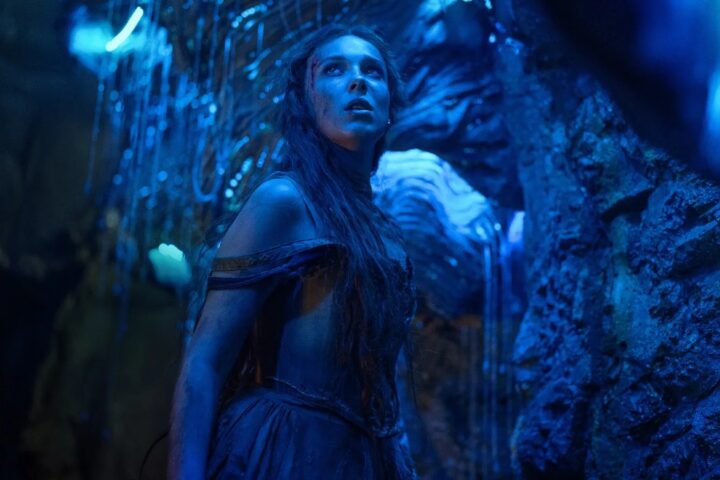With a similar elevator pitch and budget as M3GAN, Jeff Wadlow’s Imaginary is clearly striving to become 2024’s PG-13 horror darling about an evil children’s doll wreaking havoc on a family already in a state of metamorphosis. Regrettably, the filmmakers here have completely abandoned the archness of tone and shades of camp that made M3GAN such an entertaining, if ultimately inconsequential, experience. In place of that film’s knowing playfulness is an overwrought family drama that’s as undercooked as it is painfully familiar.
The blended family at the center of Imaginary consists of comic book artist Jessica (DeWanda Wise), her new husband, Max (Tom Payne), and his two kids from a previous marriage, Taylor (Taegen Burns) and Alice (Pyper Braun). While moody, edgy teenager Taylor constantly gives Jessica the cold shoulder, Alice—much to her big sister’s chagrin—has started to warm up to her stepmom. The stress caused by this dynamic continues to percolate as the family moves into Jessica’s childhood home, which Jessica thinks of as her “happy place” despite repeatedly saying that she has no memories of the first five years of her life she spent there.
When the film isn’t busy serving up one solemn, shoddily scripted scene after another revolving around Jessica struggling to make headway with Taylor, it follows Alice as she befriends an old stuffed bear named Chauncey, which she found—where else?—tucked away in the deepest corners of her new home’s basement. Soon Chauncey starts talking to Alice, convincing her to play increasingly ridiculous and dangerous games that threaten the lives of others, including the hunky neighbor (Matthew Sato) that Taylor has set her sights on, and it’s right around here that Imaginary starts begging for a more, well, imaginative approach to the material.
Somehow, this film about an imaginary friend in the form of a teddy bear never thinks to lean into the blatant silliness that its premise invites. It instead remains a frustratingly dour and humorless affair, expecting the audience to find Chauncey, and the scenario, frightening without bothering to deliver a single scare or even set a discernibly creepy mood.
This misjudgment in tone leads to several unintentionally funny scenes, such as when, after hearing Chauncey speak without Alice’s lips moving, the young girl’s therapist (Veronica Falcón) asks Alice if her stepdaughter has taken up any new hobbies like ventriloquism. It’s a moment obviously ripe for humor, but the film plays it completely straight, even doubling down on its self-seriousness right after with a twist that’s as inane as it is telegraphed.
As Alice’s behavior becomes more and more erratic, and Jessica begins to slowly recall her childhood trauma, including her own former attachment to the doll, Imaginary shifts gears, taking the audience into a more fantastical realm. The opportunities for mind-warping visuals, or at least something remotely offbeat, are aplenty during this stretch. Yet this imaginary world is as dull and colorless as the one its characters are whisked away from, drowned in monochromatic blues and flat, monotonous CGI. Every step of the way, this is a film that desperately wants to capture both the potentially vitalizing and perilous powers of imagination, which makes it all the more surprising just how sterile and uninspired it is.
Since 2001, we've brought you uncompromising, candid takes on the world of film, music, television, video games, theater, and more. Independently owned and operated publications like Slant have been hit hard in recent years, but we’re committed to keeping our content free and accessible—meaning no paywalls or fees.
If you like what we do, please consider subscribing to our Patreon or making a donation.



